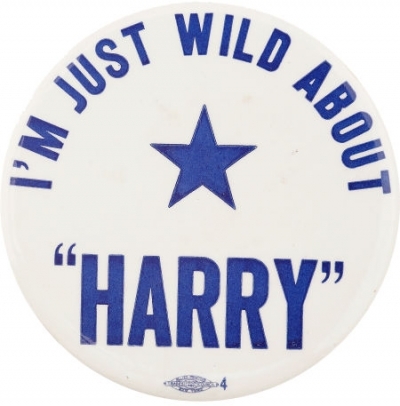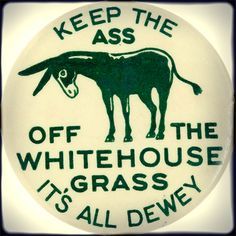One billion dollars. That's how much candidates for the upcoming US midterm elections have raised for their House and Senate campaigns. A billion freaking dollars! And actually, according to figures released by the FEC and shared by Opensecrets.org, that's rounding down. With more than six weeks to go until election night, the total might jump up to $1.5 billion. That's what it takes to take candidates around their states in nice air conditioned RVs and private planes, and, of course, to film horrendous TV promos (though they'll be hard pressed to beat Jeff Wagner's ad from the 2013 Minneapolis mayoral race). In the 2012 Presidential election, Barack Obama and Mitt Romney spent almost $2 billion.
Rewind to 1948, before the days of super PACs, TV debates and, well, shirtless guys climbing out of lakes to drink coffee, and you'd find a completely different campaign cycle. Nobody likes to back a loser, and that's just what most journalists, politicos and pollsters thought President Harry Truman would be come election night.
Thrust into the White House by the untimely demise of Franklin Roosevelt two years before, Truman had helped the Allies win the war in the Pacific with a decision no leader should have to make. Then he squared his shoulders as peacetime problems marched toward him, overcoming millions of workdays lost to strikes and taking two giant steps forward in civil rights by ending pay discrimination for federal employees and desegregating the US Armed Forces.
And yet the Southern Democrats (aka Dixiecrats) had broken away in protest of this civil rights program, rallying around J. Strom Thurmond, the fiery former Governor of South Carolina who declared that "there's not enough troops in the Army to break down segregation." The Democratic Party also split to the left, with former Vice President Henry Wallace calling for a conciliatory stance toward Soviet Russia and nationalized industries as leader of the Progressive Party.
Meanwhile, the Republicans, out of power since FDR won the 1932 election, believed they would recapture the White House by putting debonair former New York Governor Thomas E. Dewey - who'd come closest of all GOP candidates to defeating FDR - and likable California Governor Earl Warren on a "dream ticket" that had the media fawning. In fact, more than two thirds of editors surveyed midway through the campaign believed Truman was done, a verdict backed up by Dewey's double digit polling leads.
So how bad did things get for Truman's finance team? Well, the President clambered on top of a chair at a White House fundraiser, and pleaded for contributions from a room of wealthy backers: "I am appealing for your help. Help to carry my message to the American people. We just haven't got the money to buy radio time. In Detroit on Labor Day we had to cut out one of the most important sections of my speech because we didn't have the money to stay on the air." The Chief Executive was certainly being truthful: despite Oklahoma Governor Roy Turner cutting a last minute check to radio networks so they'd broadcast Truman's Cadillac Square address, Truman had to edit his concluding remarks. But climbing on a chair to beg wasn't Presidential, his detractors scoffed, with Drew Pearson lamenting in his daily 'Washington Merry Go-Round' column that Truman looked "pathetic and alone."
The chair-top appeal did convince some donors to cough up, including two who gave $10,000 a piece on the spot. But the money didn't get the President very far, literally or figuratively. As his train car, the armor-plated Ferdinand Magellan, chugged into Oklahoma in the final days of September, Truman had reached the end of the line. Hearing that the Democratic National Committee was hard up, the railroads took a page from the radio network's playbook, demanding up front payment for fuel and other fees. The trouble was, the coffers were empty. For Truman to continue on his 31,000 mile Whistle Stop Tour that he had started in June and complete the rest of the planned 352 speeches (he gave up to 16 a day), it looked like he'd need an act of God.
Click here to read the rest of the post at The Huffington Post.
And don't forget to click here to pre-order your copy of Whistle Stop: How 31,000 Miles of Train Travel, 352 Speeches, and a Little Midwest Gumption Saved the Presidency of Harry Truman.
Want to buy a signed copy? Then e-mail me today and we'll figure it out.


No comments:
Post a Comment